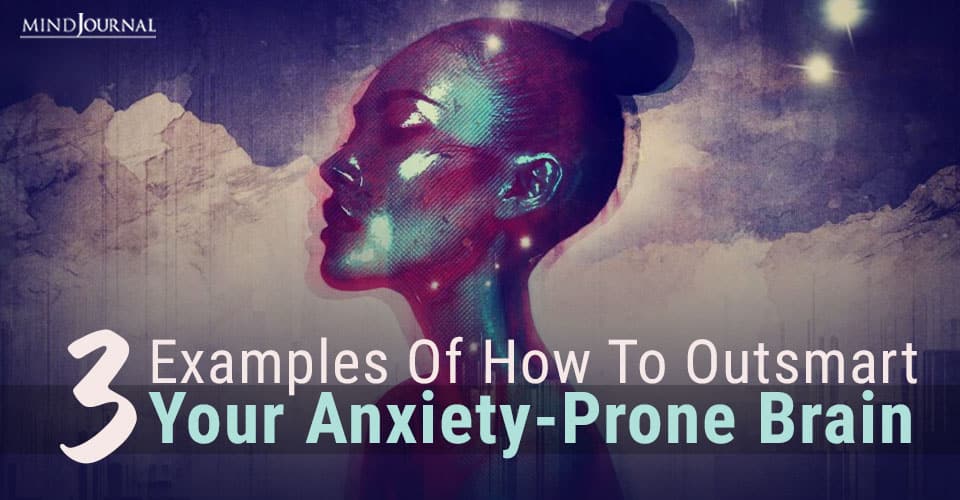When you are struggling with an anxiety-prone brain every day, things might seem bleak and annoying most of the time. But the good news is that there are some effective ways with the help of which you will be able to outsmart your anxiety-prone brain and have a happier and more peaceful life.
How I use CBT skills to deal with anxiety in real life, and how you can too!
I’ve written a lot about how I’m anxiety-prone by nature. Because of this, I find myself using my own advice constantly. Sometimes people find it hard to make the mental leap from understanding the general principles of cognitive psychology to the messy reality of using cognitive strategies in their own life.
Therefore, I wanted to give some specific examples of how I do this so that you can see how you can do it too. These are just a few of the Cognitive Behavioral Therapy strategies I’ve used in my everyday life in the past week. The first example is low key; the other two are more significant.
Here Are 3 Examples of How to Outsmart Your Anxiety-Prone Brain
1. For a complex task, do the least intimidating steps first.
Cognitive-behavioral principle: Doing new things is often anxiety-provoking. You can more easily get yourself to do things you feel intimidated by if you break your task down into all its steps and start with whatever you don’t feel overwhelmed by.
Real-life example: For ages, I’ve wanted to try making cultured cashew cheese. The recipe I plan to use has several steps that each require multiple days. To make this recipe less daunting, I broke down all the steps in the task. There were a few I didn’t feel intimidated by, so I started with those:
1. I made a behavioral commitment to getting started by buying a specialty ingredient I needed from Amazon.
2. I got some jars cleaned and ready to go.
3. I got some cheesecloth from the dollar store.
4. I added the other ingredients I needed to my shopping list.
How you can use this strategy:
Try making a separate to-do list for each project you want to undertake, rather than using a daily to-do list. Include all the steps involved in your task on your list, even the very minor ones. Then start with the easy steps. You don’t need to begin with the most obvious first steps.
The more steps you complete, the more your confidence will grow. By the time you’ve got some steps under your belt, the other steps will feel less daunting. This is a strategy I use frequently; I could easily have given several other examples just from the past week.
Related: 20+ Best Meditation Music For Relief From Stress and Anxiety
2. Find calming, grounding self-talk that works for you.
Cognitive-behavioral principle: When you know your typical anxiety patterns, you can develop self-talk responses to anxiety thoughts that you can whip out as required.
Real-life example: I have a health condition that causes pain and recently flared up. This condition can be caused by several very serious underlying conditions, or it can have “no known cause,” which is what I have. I overheard my spouse telling our friend that I hadn’t been well. The problem was that I overheard my spouse saying that there’s a small possibility that my condition does have a serious underlying cause, and it was just missed by my doctors.
As you can imagine, overhearing this caused my anxiety to spike, and I also felt pretty irritated. How I coped was to remind myself that I don’t have to let what anyone else says get to me (a strategy I outlined in an article I wrote last week and then needed to use myself a few days later!).
I’m confident in the medical opinion I’ve received, and I know my spouse is prone to health anxiety, which sometimes gets projected onto me. I reminded myself that, of course, there is always a chance of something being missed when it comes to medical diagnoses, but that is a very small possibility. The most likely scenario is that the diagnosis I’ve been given is accurate.
The specific self-talk I used, in this case, was: “Nothing has changed. Everything, in reality, is just the same as it was a few minutes ago when I felt perfectly calm.” I chose to forgive my spouse for saying something I didn’t appreciate because that was the most useful thing to do in this instance. This is how you can outsmart your anxiety-prone brain.
How you can use this strategy:
Finding the self-talk that helps you calm down is part science and part art. Experiment and see how you do. I’ve written here about how you can cope when a family member pushes one of your emotional buttons. In my example, I used at least four different cognitive-behavioral skills — assessing reality, coping with uncertainty, acceptance, and forgiveness.
For heavy-duty anxiety-provoking situations, you’ll typically need to blend various psychological skills, as I did here. If you suffer from pain, I’ve also written tips for coping with physical pain.
Related: How To Overcome Social Anxiety: 10 Steps To Beat It For Good
3. Don’t get stressed out about problems that haven’t happened yet.
Cognitive-behavioral principle: Sometimes you know a potential problem is on the horizon. You could get stressed out about it, or you could wait and see if the problem actually eventuates.
Real-life example: This is another case where I could give numerous examples from this week alone. Here’s one: I recently bought an investment property in a foreclosure auction, and I’m waiting for the current occupant to vacate the property before we can get started on our repairs. In reality, we can’t start the repairs until we get the building permits, so that is going to take some time anyway.
There’s no reason to get stressed out about when the occupant will leave unless a situation arises in which the occupant won’t leave, and we’re ready to start the repairs. That hasn’t happened yet. I could waste emotional energy worrying about it, or I could let the situation play out and deal with any problem if/when I have one. And intervening myself at this point would be micromanaging my team. Remember this and you will easily outsmart your anxiety-prone brain.
How you can use this strategy:
When you foresee a potential problem, ask yourself if there is anything you should be doing to preemptively avoid the problem occurring. If you conclude that logically the best thing to do is wait, do that. You can trust yourself that if a real problem does eventuate, you’ll have skills for coping with it.
This is also a scenario where you’ll want to remind yourself that there are many possible outcomes that fall in between “everything goes completely smoothly” and “a complete disaster.” Remind yourself that you can cope with any scenario — if it turns out you need to.
Related: 36 Most Relaxing Songs For Anxiety, Stress And Depression
Wrapping Up
Hopefully, these examples give you a glimpse into how an expert at this stuff uses cognitive-behavioral techniques in real-life situations. It takes practice and getting to know yourself, but when you master these skills, you’ll use them all the time and benefit greatly from doing so.
People with anxiety often try to avoid situations involving uncertainty. Given that life will always involve uncertainty, this is a losing battle. When you have cognitive-behavioral skills, you’ll feel less of a need to try to avoid uncertainty and can push yourself to higher heights.
These are some easy steps by which you can outsmart your anxiety-prone brain.
Written by Alice Boyes Ph.D.
Originally appeared on Psychology Today
The author of The Healthy Mind Toolkit











Leave a Reply